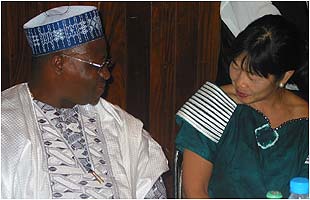Dariye, Hiding Behind Constitutionality
 In Jos, Plateau state, Joshua Dariye, governor and fugitive of the British law has been under investigation by the Economic and Financial Crimes Commission (EFCC) for a couple of years now. He has been engaged in a tussle to hang on to power (and therefore guaranteed immunity from prosecution) through all sorts of underhanded tactics including bribery and intimidation of all 24 members of the Plateau state legislative assembly. 16 of these legislators have been indicted in their own separate acts of graft (many in complicity with the governor) and are currently incarcerated for these by the EFCC, leaving the Plateau state house with only 8 sitting members.
In Jos, Plateau state, Joshua Dariye, governor and fugitive of the British law has been under investigation by the Economic and Financial Crimes Commission (EFCC) for a couple of years now. He has been engaged in a tussle to hang on to power (and therefore guaranteed immunity from prosecution) through all sorts of underhanded tactics including bribery and intimidation of all 24 members of the Plateau state legislative assembly. 16 of these legislators have been indicted in their own separate acts of graft (many in complicity with the governor) and are currently incarcerated for these by the EFCC, leaving the Plateau state house with only 8 sitting members.
Over the past few weeks, this 8 member house has been trying to constitute a panel to hear the allegations of graft leveled against Dariye, and institute impeachment proceedings as a fall out, if the governor is found wanton. 2 of the 8 legislators have declined participation in the proceedings, raising the question of the constitutionality of the panel since the Plateau state constitution requires that such a panel be constituted by at least one-third of the 24 legislative members, and not the one-fourth that the current 6 member panel constitutes. This segues into the issue of whether the 16 Plateau state legislative house members in EFCC net should not automatically lose their positions as legislators and therefore be replaced by newly elected ones in freshly held run-off elections.
Expensive as it may be, replacing these compromised 16 legislators by new ones will afford the constitution of a panel to hear the case against the governor from a full house of 24 members. That way, not only will the issue of constitutionality not arise, it will also mitigate any bias or malafide intentions that may exist between the governor and the 8 legislator who are not in complicity with the governor in his indictment. Also, it will remove any suspicion that those 6 legislators that make up the current controversial panel are a tool of the EFCC. In addition, it will restore the loss of representation at the state assembly for the constituencies from which the incarcerated legislators hail.
The case against Dariye appears very strong. It will be a shame to bungle it up and let the man go scot-free on the basis of unconstitutionality.

3 comments:
While impeachment is the most preferable way to deal with corrupt executives protected by the immunity clause, this approach may prove to be detriment if misused. Ekiti state is an example. In difficult cases like Dariye’s, I would rather have the EFCC continue building the case by assembling evidence that can stand in court. Eventually he will lose that immunity and that will be the time for EFCC to strike
He will certainly not go scott free. Politicians will always try to intimidate their legislators as well as other arms of government but justice will always prevail.
The cloak of immunity will be lifted once his tenure is over. The law is open to interpretation.
keep the flag flying guy. Im encouraged and ppl like you keep giving us hope.
Post a Comment